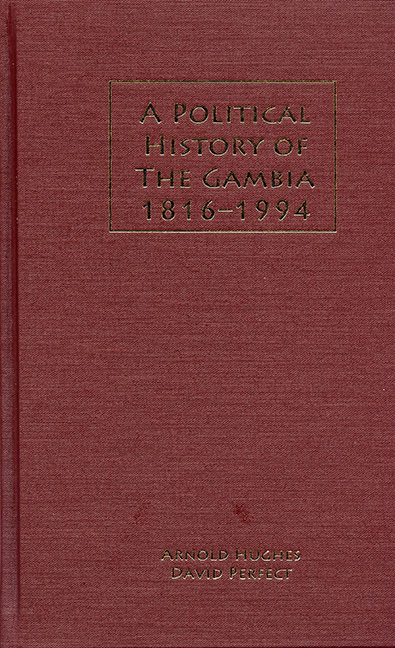Book contents
- Frontmatter
- Dedication
- Map
- Contents
- List of Tables
- List of Interviewees
- Acknowledgments
- Abbreviations
- Introduction
- 1 Social and Economic Setting
- 2 Constitutional Change in The Gambia, 1816–1994
- 3 Merchants and Recaptives: The Origins of Modern Politics, 1816–86
- 4 Patrician Politics in the Era of the Forsters, 1886–1941
- 5 The Establishment of Party Politics, 1941–59
- 6 The “Green Uprising”: The Emergence of the People's Progressive Party, 1959–65
- 7 Electoral Politics, 1965–81
- 8 Radical and Insurrectionary Political Challenges, 1965–81
- 9 Electoral Politics, 1981–94
- 10 The Gambia's External Relations, 1965–94
- 11 The 1994 Coup and the Jawara Legacy
- Appendix A Major Constitutional Changes, 1816–1994
- Appendix B Legislative Council Election Results, 1947–54
- Appendix C General Election and By-Election Results, 1960–93
- Appendix D Presidential Election Results, 1982–92
- Appendix E Republic Referendum Results, 1970
- Appendix F Primary Sources
- Appendix G Newspapers and Magazines Consulted
- Notes
- Bibliography
- Index
- Rochester Studies in African History and the Diasora
Introduction
Published online by Cambridge University Press: 13 April 2017
- Frontmatter
- Dedication
- Map
- Contents
- List of Tables
- List of Interviewees
- Acknowledgments
- Abbreviations
- Introduction
- 1 Social and Economic Setting
- 2 Constitutional Change in The Gambia, 1816–1994
- 3 Merchants and Recaptives: The Origins of Modern Politics, 1816–86
- 4 Patrician Politics in the Era of the Forsters, 1886–1941
- 5 The Establishment of Party Politics, 1941–59
- 6 The “Green Uprising”: The Emergence of the People's Progressive Party, 1959–65
- 7 Electoral Politics, 1965–81
- 8 Radical and Insurrectionary Political Challenges, 1965–81
- 9 Electoral Politics, 1981–94
- 10 The Gambia's External Relations, 1965–94
- 11 The 1994 Coup and the Jawara Legacy
- Appendix A Major Constitutional Changes, 1816–1994
- Appendix B Legislative Council Election Results, 1947–54
- Appendix C General Election and By-Election Results, 1960–93
- Appendix D Presidential Election Results, 1982–92
- Appendix E Republic Referendum Results, 1970
- Appendix F Primary Sources
- Appendix G Newspapers and Magazines Consulted
- Notes
- Bibliography
- Index
- Rochester Studies in African History and the Diasora
Summary
This is the first full-length account of the modern political history of The Gambia, covering the period from the establishment of the British settlement of Bathurst on St. Mary's Island (site of the modern capital, Banjul) on the estuary of the River Gambia in 1816, to the overthrow of the elected government of President Sir Dawda Jawara in an army coup in July 1994. During this long period, British colonial rule gradually spread up river to form the British Protectorate of Gambia. Initially disputed over with the French, this territory subsequently was contested by African political movements seeking a transfer of power to an elected Gambian parliament. This was achieved with Gambian independence in February 1965.
Following independence, Gambians refuted the claims of skeptics, British as well as African, that such a small state could not long survive the economic challenges of statehood without being absorbed by its larger neighbor, Senegal; or only surviving as a client-state of its former rulers. Adroit political leadership kept the Senegalese at bay, even during the crisis years of the early 1980s, and established an uncommonly harmonious and unexpectedly equal relationship with Britain.
Doubts were also expressed about the political skills of the country's newly elected and inexperienced political leaders. Yet here too, The Gambia came to acquire a reputation both for political stability and an unusually democratic system of government. Credit for this enviable state of affairs goes as much to Gambians themselves as to their leaders. Gambian politics has been characterized by a lack of extremism: relations with the British were seldom rancorous and those between rival political parties conducted within a shared system of political beliefs that repudiated the systematic use of violence in pursuit of political objectives; or authoritarianism to maintain those objectives when once in power.
Likewise, no doubt reflecting their country's smallness, Gambians have escaped the pretensions and extravagant posturings of larger African countries in their external relations. Instead, a low-key realism and pragmatism has informed foreign policy decision making.
- Type
- Chapter
- Information
- A Political History of the Gambia, 1816–1994 , pp. 1 - 5Publisher: Boydell & BrewerPrint publication year: 2006

